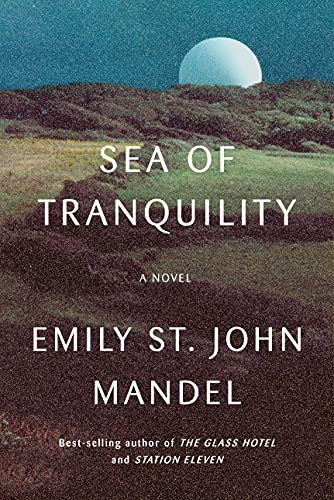 Edwin St. John St. Andrew, eighteen years old, hauling the weight of
his double-sainted name across the Atlantic by steamship, eyes
narrowed against the wind on the upper deck: he holds the railing with
gloved hands, impatient for a glimpse of the unknown, trying to
discern something—anything!—beyond sea and sky, but all he sees are
shades of endless gray."
Edwin St. John St. Andrew, eighteen years old, hauling the weight of
his double-sainted name across the Atlantic by steamship, eyes
narrowed against the wind on the upper deck: he holds the railing with
gloved hands, impatient for a glimpse of the unknown, trying to
discern something—anything!—beyond sea and sky, but all he sees are
shades of endless gray."
|
 |
| Amazon |
A time travel story in which a glitch in time brings centuries together. And sends characters from earlier novels into alternate timelines. These stories slowly weave together into a mesmerizing whole. B+
Grade: B+
I was hooked by the first words, "Edwin St. John St. Andrew, eighteen years old, hauling the weight of his double-sainted name across the Atlantic by steamship, ..." Who names a character that? I guess Emily St. John Mandel does, going her own single-sainted name one better.
You don't need to have read Mandel's "Station Eleven" or "The Glass Hotel" but your experience with her latest novel will be the richer if you have. Characters and events from earlier books reappear, with more detail. Themes reappear, with deeper meaning.
In "Sea of Tranquility" we get the stories of several characters living in very different places in very different centuries. There's Edwin, banished from polite society in England in 1912, who ends up in a remote forest on Vancouver Island. There's Mirella and Vincent, characters from "The Glass Hotel" who have a mysterious detail from Vincent's life as a filmmaker in 2020 explained thanks to the nature of time travel in Mandel's latest novel. There's Olive, an author who lives in a Moon colony in 2203, on a book tour on Earth promoting a novel about a pandemic, not dissimilar to the pandemic in "Station Eleven." There's Gaspery-Jacques Roberts, in 2401, a detective for something called the Time Institute, whose job it is to explore, well, glitches in time, one of which is at the core of this novel.
Is this sci-fi? Yes, but don't pigeonhole and dismiss it too quickly. Even though it's a story that involves time travel, it's not a story about time travel. It's also not a story about climate change, Moon colonies, and pandemics, even though, given the novel's long time span, Earth experiences all of those things during that 500 year time span. Those events all happen off stage, so to speak, with respect to this novel, which focuses on personal stories of people who just happen to live in these times.
This is maybe more a novel about how nothing is ever new, and nothing is ever over and done with. Olive, on her book tour, muses about how every hotel looks like every other hotel to an author on a book tour. In a slightly wider perspective, odd experiences that all the characters in the novel have turn out to be related in a quantum multiverse kind of way. In the widest perspective of all, every end-of-the-world catastrophe isn't really the end of the world. The world always goes on.

No comments:
Post a Comment
Keep it courteous, clean, and on topic.
Include your name.
Anonymous commenters are unwelcome.